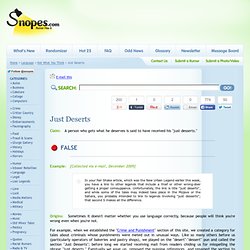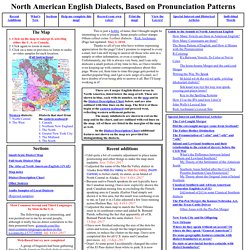

Frequently Asked Questions. Animal Groups. Just Deserts. Claim: A person who gets what he deserves is said to have received his "just desserts.

" Example:[Collected via e-mail, December 2009] In your Fair Shake article, which was the New Urban Legend earlier this week, you have a link to other legends that include a thief or other wrong-doer getting a proper comeuppance. Unfortunately, the link is title "just deserts", and while some of the tales may indeed take place in the Mojave or the Sahara, you probably intended to link to legends involving "just desserts"; that second S makes all the difference. Origins: Sometimes it doesn't matter whether you use language correctly, because people will think you're wrong even when you're not.
For example, when we established the "Crime and Punishment" section of this site, we created a category for tales about criminals whose punishments were meted out in unusual ways. You spell "Dessert" wrong in this link. I think your intention is to refer to metaphor using the term for after dinner snack.
Words in English. A Brief History of English, with Chronologyby Suzanne Kemmer © 2001-2005 Pre-English | Old English | Middle English | Modern English The language we call English was first brought to the north sea coasts of England in the 5th and 6th centuries A.D., by seafaring people from Denmark and the northwestern coasts of present-day Germany and the Netherlands.

These immigrants spoke a cluster of related dialects falling within the Germanic branch of the Indo-European language family. Their language began to develop its own distinctive features in isolation from the continental Germanic languages, and by 600 A.D. had developed into what we call Old English or Anglo-Saxon, covering the territory of most of modern England. New waves of Germanic invaders and settlers came from Norway and Denmark starting in the late 8th century. The Norman Invasion and Conquest of 1066 was a cataclysmic event that brought new rulers and new cultural, social and linguistic influences to the British Isles.
A whole nother language. Lauren Collins, the New Yorker writer who profiled Benjamin Creme in the Nov. 29 issue, described the London-based spiritual leader as — among other things — “ruddy-complected.” I’ve grown accustomed to seeing the occasional typo, as well as the occasional F-word, in the magazine, but complected — that was a bit of a shock. Wasn’t that a word to avoid in polite company, hardly better bred than irregardless and ain’t? Complected, our teachers told us, was a misbegotten monster. It seems to have been derived from complection, a once-familiar variant spelling of complexion, but the language didn’t need it; we already have complexioned, in use since the 17th century. And despite its appearance, it’s not related to the verb complect, which means “to interweave.” Still, if complected had been a favorite of Jane Austen and Emily Bronte, it might be the standard form today.
American English Dialects. North American English Dialects, Based on Pronunciation Patterns Small-Scale Dialect Map The small map below is the same as the Full-Scale Dialect Map that follows, but shows the entire width of the map (on most monitors). 24-Aug.-2010 Click on any part of this map to move to the equivalent part of the Full-Scale Dialect Map.

(For now this only moves to the far left or the far right of the Full-Scale Dialect Map, so unfortunately it doesn’t work well for the middle portions, and you will just have to scroll over.) 24-Aug.-2010 Full-Scale Dialect Map Instructions For many of the cities or towns on this map, you can listen to an audio or video sample of speech of a native (more specifically, someone who was raised there, though not necessarily born there, and whose dialect clearly represents that place).
The cities and towns with a large dot are those which are larger or more important in each state or province. Help! Data from the Atlas of North American English (ANAE) Map Notes Other Sources.